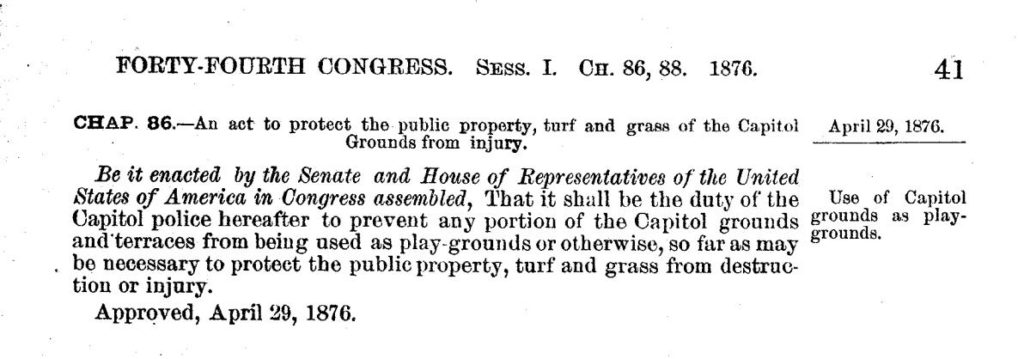
A four-word ode to grumpiness and grass turned into an enduring national punchline
Over the years, a beautiful yard has become a classic American one-liner in which a grumpy old man, spotting youngsters crossing his grass, rails, “Get off my lawn!”
What wayward kids today may not appreciate in this iconic duck-and-cover is the symbolic role that fine lawns have and continue to play in America’s cultural revolution.
Prior to the mid-1900s, American lawns came in three varieties: public grounds, a few fussy estates owned by the wealthy and a ginormous, undeveloped rural expanse primarily tended by cattle. There was the ugly incident in 1876, when Congress passed a law forbidding the Capitol grounds from being used as a playground after a rowdy Easter egg hunt. But for the most part, lawns were a peaceful rarity until the economic expansion that followed World War II. New suburban developments lured veterans into the sparkling new suburbs, and a love for lawns entered the national psyche as an important part of the American Dream.

Google’s Ngram Viewer, which tracks the use of phrases in books, says the phrase took off in popularity in the early 1960s when the first baby boomers came of age. Baby boom youths, with their countercultural hippie movement, provided their parents with the trespassing youths to yell at, further embedding this humorous archetypal clash between old men and proud boys into the American consciousness. To the hippie mind, the scene came to represent the counterculture’s rejection of middle-class material goods, as symbolized by the well-trimmed suburban lawn.
David Letterman, ‘The Simpsons,’ Clint Eastwood popularize the phrase
Talk-show host David Letterman may not have created the phrase, but he popularized it. The Indiana-born boomer jumped at the phrase, adopting it as one of his signature tag lines beginning in 1980, barking “Get off my lawn!” into mainstream American consciousness.
Baby boomer humor grew to dominate sitcoms throughout that decade, ultimately elevating “Get off my lawn!” to iconic status. Homer Simpson helped spread its fame in a 1992 episode of the suburban satire, “The Simpsons.” His cartoon father, Abraham Simpson, expressed a similar pointless rage in the meme-worthy “Old man yells at cloud.”
Grumpy old men are a staple of the big screen, but veteran actor Clint Eastwood elevated it to a new, violent height in his 2008 film “Gran Torino,” in effect reprising his own catchphrase, “Go ahead, make my day,” from his 1983 Dirty Harry classic, “Sudden Impact.”
Musical ‘Get Off My Grass’ references
Popular music has yet to fashion a true Grumpy hit, although numerous songwriters have played with the idea. Perhaps best known of the contenders is a homemade YouTube backyard rocker, “Hey You Kids Get Off of My Lawn,” by two nongrumpy dudes cleverly named Auld Guise. Although Minnesota singer-songwriter David Stoddard’s 2016 album “Get Off My Lawn,” lacks an actual single by that name, Spotify lists one by Wormhole Effect, YouTube features a video of another by Grasscore and Shrapnel Records offers a 2006 recording called “Get Out of My Yard” by Illinois guitar shredder Paul Gilbert on which the only lyrics to the title track consist of “Get out of my yard” being screamed by the artist through his guitar pickups. There’s even a country-rock party band based in Conway, Ark., named Get Off My Lawn.
Memes, mugs and yard signs
By the ’90s, the internet had hit its stride, and what better way for a new, rebellious generation of young people to celebrate their presence than to officially ridicule all things old and grumpy, elevating the lawn exchange to a ubiquitous meme? What was becoming a symbol of generational clash not only spawned an assortment of online products, including yard signs, T-shirts, coffee mugs and towels, but its growing online presence helped it work its way into politics.
“The Simpsons” creator Matt Groening unwittingly embedded Grumpy into the political arena in 1991. That’s when he decided to add a cartoon version of President George H.W. Bush to his cast. The juxtaposition of H.W. and the Simpsons milieu and its success in humanizing one of America’s more remote presidents may have helped inspire the “Get Off My Lawn Podcast,” hosted by far-right Canadian commentator Gavin McInnis, and “Hey, Get Off My Lawn!!!,” a Sirius/PRX “reality radio” show hosted by stand-up comic Bryan Cox.
The phrase is here to stay
Keeping up with the times, the phrase has now been attached to Vermont U.S. Sen. Bernie Sanders, casting him as the political equivalent of the grumpy old man role in social media memes. The phrase has even been proposed as a character skin for the game Fortnite.
How is it that similarly dismissive catchphrases (“Gag me with a spoon,” “Talk to the hand”) have faded while “Get off my lawn” continues to thrive like bluegrass in May? Perhaps the secret lies in the interchange between who’s on the lawn and who may soon be under it. Its value endures because we know we won’t. Young and old alike can easily picture themselves in this existential selfie.